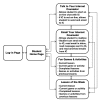Development of an internet-based obesity prevention program for children
- PMID: 20513340
- PMCID: PMC2901051
- DOI: 10.1177/193229681000400328
Development of an internet-based obesity prevention program for children
Abstract
Background: Childhood obesity is a growing problem, particularly in rural, Louisiana school children. Traditionally, school-based obesity prevention programs have used a primary prevention approach. Finding methods to deliver secondary prevention programs to large numbers of students without singling out overweight students has been a challenge. An innovative approach to achieving this goal is through use of an Internet intervention targeted toward a student's weight status. This article describes the Louisiana (LA) Health Internet intervention, including the student Web site, the Internet counselor Web site, and the Internet counseling process.
Method: The LA Health Internet intervention had separate interfaces for students and Internet counselors. The main features of the student site were behavioral weight loss lessons, lesson activities, chat with an Internet counselor, and email. The Internet counselor site contained these same features, plus a student directory and various means of obtaining student information to guide counseling. Based on their baseline weight status, students received lessons and counseling that promoted either weight loss or weight maintenance. Intervention was delivered during class time, and teachers scheduled Internet counseling sessions with intervention personnel.
Results: The LA Health Internet intervention was initially implemented within 14 schools; 773 students were granted access to the site. From Fall 2007 to Spring 2009, 1174 hours of Internet counselor coverage was needed to implement the Internet counseling component of this intervention
Conclusion: The LA Health Internet intervention is an innovative and feasible method of delivering a secondary prevention program within a school setting to large numbers of students.
Trial registration: ClinicalTrials.gov NCT00289315.
(c) 2010 Diabetes Technology Society.
Figures







References
-
- Summerbell CD, Waters E, Edmunds LD, Kelly S, Brown T, Campbell KJ. Interventions for preventing obesity in children. Cochrane Database Syst Rev. 2005;(3):CD001871. - PubMed
-
- Tate DF, Jackvony EH, Wing RR. Effects of Internet behavioral counseling on weight loss in adults at risk for type 2 diabetes: a randomized trial. JAMA. 2003;289(14):1833–1836. - PubMed
Publication types
MeSH terms
Associated data
Grants and funding
LinkOut - more resources
Full Text Sources
Medical

